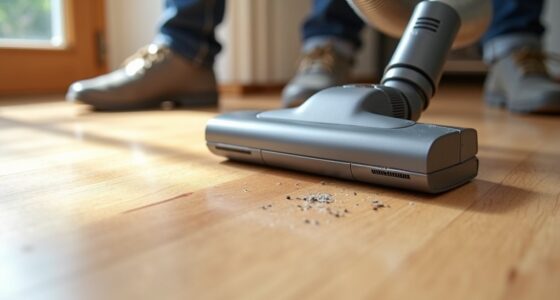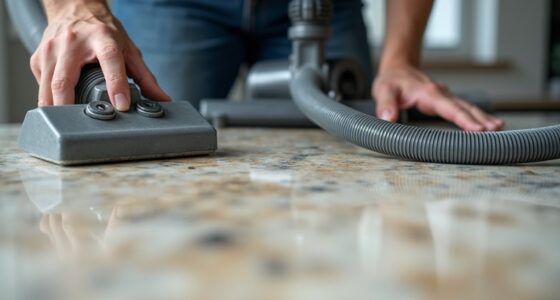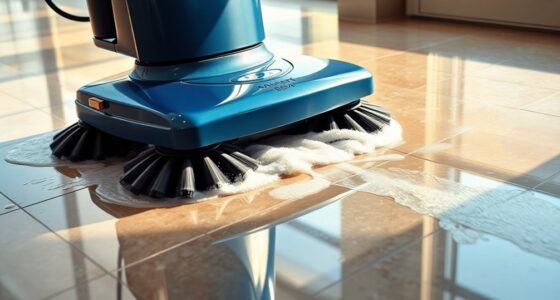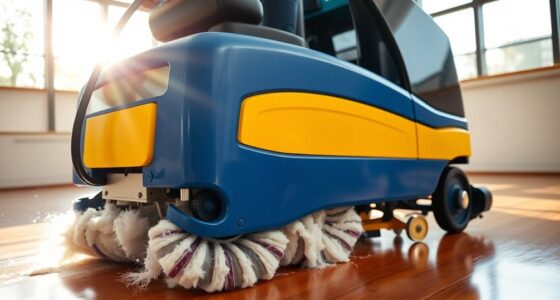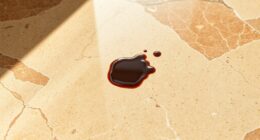Cylindrical markers are easier to clean in school hallways because their smooth, rounded surfaces resist dirt buildup and prevent debris from settling. Discs, with flat surfaces, tend to trap more debris and require more frequent cleaning to stay tidy. Plus, the rounded shape makes wiping or scrubbing simpler, reducing maintenance time. If you want to discover additional tips on choosing the best hallway markers, keep exploring the options available.
Key Takeaways
- Cylindrical markers have smoother, rounded surfaces that are easier to wipe and clean compared to flat discs.
- Cylinders resist dirt buildup better, requiring less frequent cleaning than flat disc markers.
- Discs tend to trap more debris on their flat surfaces, increasing cleaning frequency.
- Cylinders made from impact-resistant materials maintain their appearance longer with less maintenance.
- Flat disc surfaces are more prone to scratches and dirt accumulation, leading to more intensive cleaning needs.
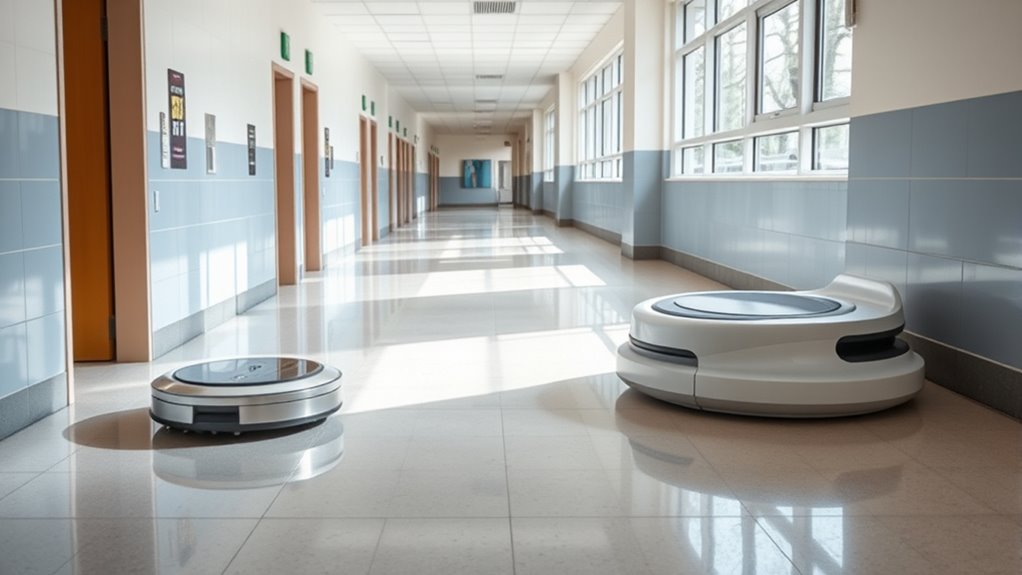
When choosing how to mark hallways in schools, the decision often comes down to whether cylindrical or disc-shaped objects are more effective. Both options serve the purpose of guiding students and staff, but their cleaning efficiency and durability can vary markedly. If you’re prioritizing ease of maintenance, understanding these differences will help you make a smarter choice.
Cylindrical markers tend to be smoother and often have fewer surface edges, which makes cleaning relatively straightforward. Their rounded shape allows for easy wiping or scrubbing without getting caught on corners or edges. Because dirt and grime don’t settle as easily on curved surfaces, you may find that cylindrical objects retain their appearance longer with less frequent cleaning. This can be a considerable advantage in busy hallways where cleanliness is essential. Additionally, cylindrical markers are usually made from durable materials like high-impact plastics, which resist cracking and chipping over time. This means they can withstand the constant foot traffic, accidental kicks, or bumps common in school environments. Their durability comparison shows they tend to last longer, reducing replacement costs and upkeep efforts.
Disc-shaped objects, on the other hand, often have flat surfaces that can accumulate dirt and debris more readily. Their shape might require more frequent cleaning, especially on the flat top and edges, to maintain a tidy appearance. However, discs can offer advantages in visibility, as their broad surface area makes them more noticeable from a distance, which can be beneficial in crowded hallways. When it comes to durability, discs are typically made from resilient materials as well, but their flat surfaces are more susceptible to scratching or surface damage that can dull their appearance over time. If the disc is made from high-quality, impact-resistant material, it can still be quite durable, but it may need more consistent maintenance to keep its visual clarity. Moreover, considering the cost of production, selecting durable materials for either shape can impact long-term expenses.
Frequently Asked Questions
Which Material Is More Eco-Friendly for Hallway Cleaning Tools?
You should choose cleaning tools made from biodegradable materials and recyclable components, as they’re more eco-friendly. These materials break down naturally, reducing landfill waste, and can be repurposed or recycled after use. By selecting products with these features, you help lessen your environmental impact. Opt for tools that prioritize sustainability, ensuring your hallway cleaning routine supports eco-conscious efforts while maintaining cleanliness efficiently.
How Do Cylindrical and Disc Designs Impact Noise Levels During Cleaning?
You’ll notice that cylindrical cleaning tools often produce less noise because their shape helps absorb sound and reduce vibration. Disc designs, with their flat surfaces, tend to generate more noise during use, especially when they hit hard surfaces. If you want better sound absorption and noise reduction, opt for cylindrical tools. They’re quieter, making hallway cleaning less disruptive and more comfortable for students and staff alike.
Are There Specific Hallway Surfaces Better Suited for One Design?
You’ll find disc designs work better on smooth surfaces like tile and hardwood floors because they glide easily and trap debris efficiently. Cylindrical models excel on textured surfaces such as carpet and vinyl, where their bristles and agitation help loosen dirt. So, choose a cleaner based on your hallway surface—disc cleaners for sleek, hard floors and cylindrical ones for carpets or textured vinyl.
What Is the Average Lifespan of Cylindrical Versus Disc Cleaning Tools?
You’ll find that cylindrical cleaning tools generally last longer, offering a better durability comparison than disc models, which tend to wear out faster. When doing a cost effectiveness analysis, cylindrical tools often prove more economical over time due to their extended lifespan. Expect cylindrical brushes to last around 6-12 months with regular use, whereas disc brushes may need replacement sooner, around 3-6 months, depending on usage and surface conditions.
Do Maintenance Requirements Differ Significantly Between the Two Designs?
Maintenance requirements differ somewhat between the two designs. You’ll find cylindrical tools need more frequent maintenance due to their complex cleaning process, like untangling a maze. Disc tools are simpler and require less cleaning complexity, making maintenance easier and less time-consuming. Overall, cylindrical tools demand higher maintenance frequency, while disc tools are more straightforward, saving you effort and keeping your cleaning routine smooth and efficient.
Conclusion
So, whether you lean towards the gentle swirl of cylindrical cleaners or the steady glide of disc models, remember, it’s all about finding what works best for your hallway. Sometimes, a little twist here and a smooth pass there can make all the difference. With a bit of patience and the right choice, you’ll keep those hallways looking fresh and inviting—like a well-kept secret just waiting to be discovered. Keep going, and you’ll make cleaning feel almost effortless.

